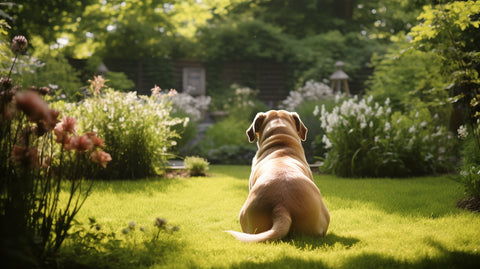Why is My Dog Scooting: Understanding the Causes and Solutions
In this article, we will delve into the curious behaviour of dogs known as scooting. Many dog owners have witnessed this peculiar action where their furry friend drags their bottom along the floor. While it might seem amusing at first, scooting can indicate an underlying issue that needs attention. In this comprehensive guide, we will explore the reasons behind this behaviour and provide valuable insights into how to address it effectively.

Table of Contents:
- Introduction
- What is Scooting?
-
Common Reasons for Scooting
- 3.1 Anal Gland Problems
- 3.2 Gastrointestinal Issues
- 3.3 Allergies and Irritation
- 3.4 Worm Infestations
- When Should You Be Concerned?
- How to Prevent Scooting
-
Effective Home Remedies
- 6.1 Dietary Adjustments
- 6.2 Proper Hygiene
- 6.3 Regular Exercise
- When to Consult a Veterinarian
-
Treatment Options
- 8.1 Medication
- 8.2 Surgical Intervention
- Maintaining Your Dog's Health
- Conclusion
- FAQs
Introduction
Dogs are known for their quirky behaviours, but when your beloved pet starts scooting across the floor, it can raise concerns. While it may appear funny, scooting is often an indication of an underlying issue that demands attention. To ensure your dog's well-being and comfort, it's crucial to understand why they engage in this behaviour and how to address it.
What is Scooting?
Scooting, in simple terms, refers to the act of a dog dragging its bum (butt - for our American readers) along the ground while sitting or lying down. This behaviour is more than just an odd spectacle; it can be a sign of discomfort or pain. To decipher why your dog is scooting, we must explore the common reasons behind this behaviour.

Common Reasons for Scooting
Anal Gland Problems
One of the primary causes of scooting is anal gland issues. Dogs have two small glands located near their anus that produce a pungent fluid. When these glands become blocked or infected, they can lead to discomfort, prompting your dog to scoot in an attempt to relieve the irritation.
Gastrointestinal Issues
Digestive problems, such as diarrhoea or constipation, can cause discomfort in dogs, leading them to scoot as a way to alleviate the discomfort. If your dog's stool is too loose or too hard, it can irritate the sensitive skin around their anus.
Allergies and Irritation
Allergic reactions or skin irritations in the anal area can also trigger scooting. Itchiness and discomfort prompt your dog to drag their bottom along the floor in an attempt to relieve the itching sensation.
Worm Infestations
Worms, such as tapeworms or roundworms, can lead to scooting. These parasites can cause anal itching and discomfort, driving your dog to scoot as a response.
When Should You Be Concerned?
Occasional scooting may not be a cause for alarm, but if your dog engages in this behaviour frequently or excessively, it's essential to investigate further. Persistent scooting can indicate an underlying issue that requires attention from a veterinarian.
How to Prevent Scooting
Preventing scooting involves addressing the underlying causes. Here are some preventive measures you can take:
Dietary Adjustments
Ensure your dog's diet is rich in fibre to promote healthy digestion. Consult your veterinarian for dietary recommendations tailored to your dog's specific needs.
Proper Hygiene
Regularly clean your dog's anal area to prevent irritation and infection. Use pet-safe wipes or mild soap and water.
Regular Exercise
Engage your dog in regular exercise to maintain their overall health. Physical activity can help regulate their bowel movements and reduce the risk of scooting.
When to Consult a Veterinarian
If your dog's scooting persists or worsens despite your efforts, it's time to consult a veterinarian. They can perform a thorough examination to identify the underlying issue and recommend appropriate treatment.
Treatment Options
Treatment for scooting depends on the underlying cause. Here are some common treatment options:
Medication
Your veterinarian may prescribe medications to alleviate discomfort, address infections, or treat underlying conditions contributing to scooting.
Surgical Intervention
In severe cases, surgical procedures may be necessary to address issues like anal gland problems or intestinal obstructions.
Maintaining Your Dog's Health
Regular check-ups, a balanced diet, and attentive care are essential for maintaining your dog's overall health and preventing scooting episodes.
Conclusion
Understanding why your dog is scooting is crucial for their well-being. By identifying the underlying causes and seeking appropriate treatment, you can ensure your furry friend lives a happy and comfortable life.
FAQs
-
Is occasional scooting normal for dogs? Occasional scooting may not be a cause for concern, but if it becomes frequent, consult your veterinarian.
-
Can I treat my dog's scooting at home? Mild cases may respond to home remedies, but persistent scooting requires professional evaluation.
-
What can I do to prevent my dog from scooting? Maintain a healthy diet, practice good hygiene, and ensure regular exercise for your dog to reduce the risk of scooting.
-
Are anal gland issues common in dogs? Yes, anal gland problems are relatively common in dogs and can lead to scooting.
-
When should I seek immediate veterinary care for my dog's scooting? If your dog displays signs of pain, bleeding, or severe discomfort while scooting, contact a veterinarian immediately.
Unlock Your Dog's Comfort with Cooper and Gracie
At Cooper and Gracie, we understand the importance of your dog's well-being. After delving into the intricacies of why your furry friend might be scooting, we're here to offer you solutions that truly make a difference. With our range of premium dog care products and a commitment to your dog's health and happiness, we invite you to take action today. Make the choice that shows your dog you care – choose Cooper and Gracie. Together, we'll ensure your four-legged companion lives a life free from discomfort and full of joy. Discover our trusted dog products and make a positive change for your pet's comfort and happiness. Don't wait; your dog deserves the best. Shop now!
Related Posts
My Dog's Breath Smells Like Fish

